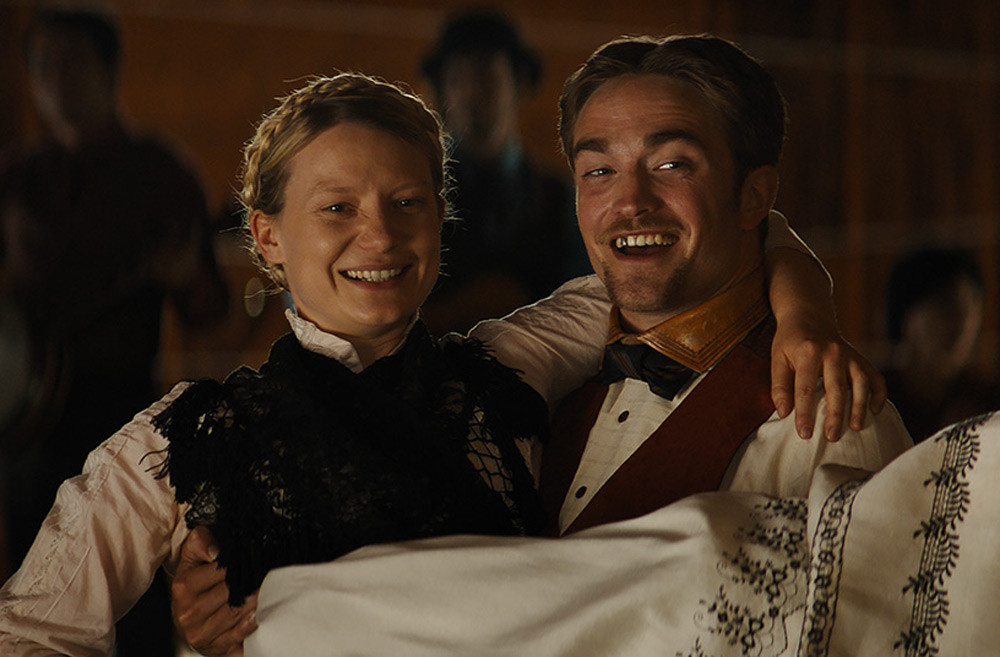In the wonderfully perverse logic that seems to govern the Zellner Brothers’ films, and by extension their careers, it only makes sense that they would make a western to follow-up their previous film, an Eastern – “Kumiko: The Treasure Hunter,” which followed Rinko Kikuchi from Japan to North Dakota, searching for the bounty left by the thieves in the Coen Brothers’ “Fargo,” gently confronting cultural differences as she made her way through the heartland snow. If one didn’t know better, you’d even suspect the string accompaniment that that follows Robert Pattinson’s Samuel Alabaster into a shantytown just off the shore, with a distinctly Asian bent, in “Damsel,” might be a sly way of connecting the two, as the Zellners’ embark on another tale of conquering loneliness wrapped in the guise of a crafty comedy. But “Damsel” seems even larger in scope than the epic “Kumiko,” not because it features the duo’s most famous stars to date in Pattinson and Mia Wasikowska, but beyond taking advantage of the sweeping vistas of the Old West by shooting in as wide a frame as a camera will allow, the film gets its arms around a bigger idea – the trouble with romanticizing anything or anyone too much, including the genre it is a part of.
There’s no denying that the Zellners have plenty of love for films set on the frontier, building in quiet nods to the slow, intimate zooms in Robert Altman’s “McCabe & Mrs. Miller” and the sound design involved in the shootouts in Sam Peckinpah’s “The Wild Bunch” where the ricochet of bullets could be augmented with a choice dissonant squeal followed by silence. They also clearly adore the lingo and the colloquialisms, throwing around words like the “doggone” variation “dagbone” as if it were confetti. But they find considerable humor in imagining how it wasn’t much fun to walk around in boots full of rocks or to know enough about knots in order to properly tie a noose, and they have no affection whatsoever for the way the West was won, observing displaced Chinese immigrants, likely brought in to work on the railroad, shuffle along in an arrow-riddled wagon and those arrows coming from Native Americans who found themselves displaced by Europeans.
“It’s all injun country, isn’t it?” Samuel casually replies when asked if he’s approaching Native American land, but pays no mind, driven by love to forge ahead. Samuel is single-minded in his pursuit of his beloved Penelope (Wasikowska), dragging a miniature horse named after her favorite candy (“Butterscotch”) across the ocean and beyond to take her hand in marriage. Enlisting the services of Parson Henry, a man of God who can officiate the wedding, he sets out to reunite with Penelope to get hitched after two years apart, but there’s a slight hitch – she was kidnapped and in hiring Parson Henry to come with him (for $150 proper legal tender), he isn’t only asking for his ability to consecrate a union in the eyes of the Lord, but serve as his lookout while he rescues his fiancee.
Although the two met at a literal cakewalk, retrieving Penelope is anything but for Samuel, and not necessarily for the reasons that you would think, which is when the Zellners’ shrewdly show Samuel experiencing the same disillusionment as the audience for portraying the West as it really was rather than what it’s remembered to be too often. Still, the brothers craft a world you want to spend as much time in as possible, making the scene where Samuel is mapping out how he will abscond with Penelope while evading her captors, using found objects from around the campfire, as enjoyable as when you see the actual escape play out. Part of the fun is seeing Pattinson cut loose as Samuel, embracing the role of a moony-eyed numskull with complete conviction while Wasikowska is enjoyably feisty as Penelope.
Yet David Zellner, who was so touching as a kind-hearted deputy officer in “Kumiko,” emerges as the MVP of “Damsel,” with Parson Henry gradually edging into the center of the film as Samuel’s plans fall apart. Hopelessly lonely, he’s comforted only by alcohol, which is never played for laughs (and becomes one of the most tender-hearted depictions of dependency in recent memory) and Zellner deftly handles playing both a bewildered travel companion to Samuel and a lost soul still reeling from when his wife died in childbirth. (It’s also delightful to see brother Nathan show up as one of Penelope’s burly kidnappers.) While “Damsel” is bittersweet, it’s truly a joy to behold, a showcase for the Zellners’ zesty wit, Pattinson and Wasikowska at their most winning and a charming new addition to the writer/directors’ (literal) stable of animal stars with the miniature horse Butterscotch, who practically runs off with the film. Fortunately, the staying power of what the Zellners have made is simply too strong.
“Damsel” does not yet have U.S. distribution.





Comments 1